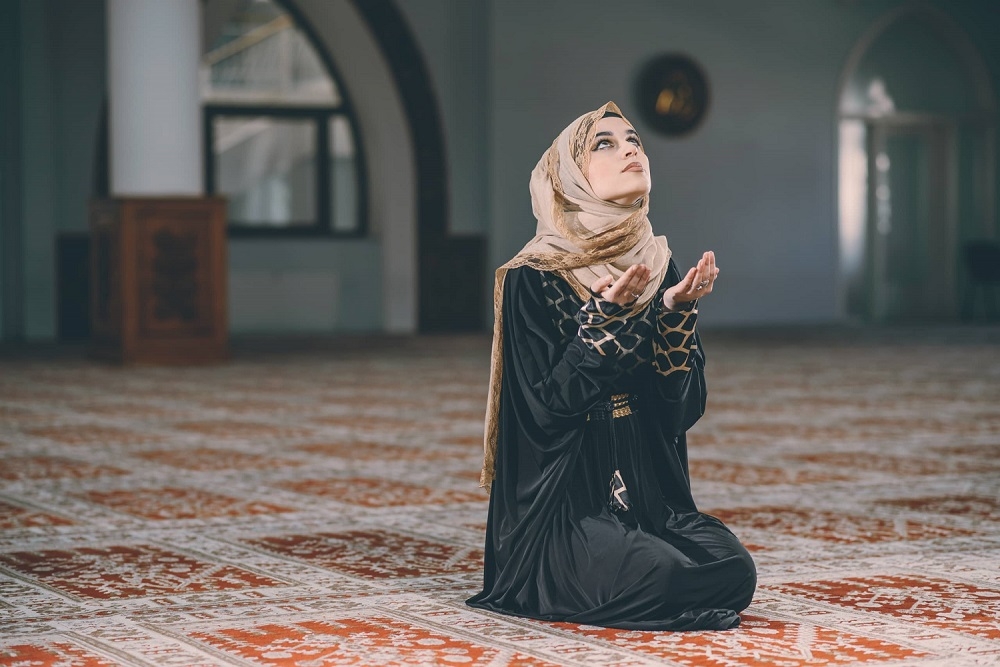Allah's (S) Forgiveness is Immediate, Powerful, Continuous & Complete – All We Need to Do is Ask
Faith
|
Apr 21, 2022
|
6 MIN READ

Image source: Seeker's Guidance
Editor's Note: This Ramadan we will be exploring various names and attributes of Allah (S) in a series, which will be featured throughout the holy month. This post focuses on Al-Ghafir, Al-Ghafoor, Al-Ghaffar and Al-Afw.
“Allah’s love and divine intimacy with us does not change, but our awareness of that love shifts due to the ever-changing states of our hearts and minds.” [A. Helwa, Secrets of Divine Love: A Spiritual Journey into the Heart of Islam]
Over the past three weeks, we’ve learned more about some of Allah (S) names, including Al-Rahman Al-Raheem, Al-Wadud and Al-Hakim. While we know that Allah (S) has 99 names (that we know of), I chose these particular names because they helped me fall in love with my creator, which helped me trust in His wisdom even when I didn’t understand it. This in turn heavily impacted and strengthened my faith, Alhamdulillah. We’re not done though – two more posts (focusing on more names of Allah (S)) to go, Insha’Allah!
This week’s theme is quite the treat, because we’ll be discussing four of Allah’s (S) names – Al-Ghafir, Al-Ghafoor, Al-Ghaffar and Al-Afw. All four of these are related to one theme: forgiveness. And oh how much we need His forgiveness!
(Learn more about verses of the Quran that speak to Allah’s (S) forgiveness here.)
Pause here for a moment. When we did a deep dive into Al-Rahman Al-Raheem, it was incredible to learn that Allah (S) used two names back-to-back to describe His mercy. And now, when it comes time to describe His forgiveness, there are multiple names (Some that I’m not even mentioning – there are at least seven!) to describe His forgiving nature. Ya Allah (S).
Let’s get into it. What do each of these names mean?
Al-Ghafoor, Al-Ghafir, and Al-Ghaffar all come from the same Arabic root word, “ghafara,” which literally means to cover up or conceal. The connotation became one of forgiveness because to forgive someone means to overlook or ignore harm they ever did to you.
Al-Ghafir is the one who forgives.
Al-Ghaffar indicates frequency; He is the one who continuously forgives.
Al-Ghafoor is the one who has the power to forgive, regardless of the sin. This is one of Allah’s (S) most often mentioned names in the Quran, about 91 times. One of the most common ways this name shows up are: “Al-Ghafoor Al-Rahim” (The forgiving and merciful) and “Al-Ghafoor Al-Wadud” (the one full of generous love, who loves to forgive), and “Al-Aziz Al-Ghafoor” (the one who forgives out of power, not out of weakness).

Image source: Pexels
In Surat Al-Hijr, ayah 49, Allah (S) says,
نَبِّئْ عِبَادِي أَنِّي أَنَا الْغَفُورُ الرَّحِيمُ
Tell My worshipers that I am the Forgiving, the Most Merciful. [15:49]
This is your Lord – who is all forgiving, who forgives when He doesn’t have to, when we don’t deserve it, who forgives out of His love for us. He’s constantly telling us about His loving and forgiving nature, so who are we to not seek his forgiveness, or worse, to despair from it and think that we have sinned too much? In this context, to despair is actually to deny Allah’s (S) power – in a way, you are telling Allah (S) that your sins are bigger than his power.
In surat Al-Zumur, ayah 53, Allah (S) says to the Prophet,
قُلْ يَٰعِبَادِىَ ٱلَّذِينَ أَسْرَفُوا۟ عَلَىٰٓ أَنفُسِهِمْ لَا تَقْنَطُوا۟ مِن رَّحْمَةِ ٱللَّهِ ۚ إِنَّ ٱللَّهَ يَغْفِرُ ٱلذُّنُوبَ جَمِيعًا ۚ إِنَّهُۥ هُوَ ٱلْغَفُورُ ٱلرَّحِيمُ
Say, ˹O Prophet, that Allah says,˺ “O My servants who have exceeded the limits against their souls! Do not lose hope in Allah’s mercy, for Allah certainly forgives all sins. He is indeed the All-Forgiving, Most Merciful. [39:53]
We are human beings; we fall short. That’s how Allah (S) created us. He didn’t create us as angels who are perfect. No matter how much we fall, we must strive to not despair in Allah’s (S) love and mercy – even when we do not understand why things happen the way they do. For sure it is hard to trust in Allah’s (S) plan, especially when we may be in crisis or managing a lifelong challenge, and sometimes we feel despair creeping in. But Allah (S) is telling us who He is, and sometimes, we just need to close our eyes, hold on, and pray for His mercy.
Remember that God’s expectation is not that we will be perfect and not sin. He created us as human, who will sin by nature, so that we may constantly turn to Allah (S), who is Al-Rahman Al-Raheem, Al-Wadud, Al-Hakim, Al-Ghaffar, Al-Ghafir, Al-Ghafoor, Al-Afw and more.

Image source: Seekers Guidance
Abu Huraira reported: The Messenger of Allah, peace and blessings be upon him, said, “By the One in whose hand is my soul, if you did not sin, Allah would replace you with people who would sin, and they would seek forgiveness from Allah and He would forgive them.”
What does this tell us? The point of our existence is not to not sin, it’s to constantly seek Him and return to Him, even when we do sin. He is the constant, His nature is constant. Our awareness of His nature can shift, depending on the state of our hearts and faith, but He does not change.
And He loves to forgive. You just have to ask for it and take the step towards Him.
Ok, so let’s get into the fourth name of this week: Al-Afw.
This name also signifies Allah’s (S) forgiving nature, but it does not come from the same root word as the others. It comes from the Arabic root word, ‘afa, which means to erase to the point that no trace is left. So while the words stemming from ghafara mean to overlook and forgive, Al-Afw means that Allah (S) doesn’t even take into account that the sin occurred. Al-Afw wipes your slate clean.
Allah (S) mentions this name several times in the Quran, typically for major sins, and the Prophet (saw) commanded us to evoke this name of Allah (S) during the last ten nights of Ramadan.
It was narrated from ‘Aishah that she said: “O Messenger of Allah, what do you think I should say in my supplication, if I come upon Laylatul-Qadr?” He said: “Say: ‘Allahumma innaka ‘afuwwun tuhibbul-‘afwa, fa’fu ‘anni'" (“O Allah, You are Forgiving and love forgiveness, so forgive me.”) [Sahih]
اللَّهُمَّ إِنَّكَ عَفُوٌّ كَرِيمٌ تُحِبُّ الْعَفْوَ فَاعْفُ عَنِّي
Here’s why saying this du’a, and asking Allah (S) for Afw is so important: We will not enter Jannah because of our good deeds; we will enter Jannah because of Allah (S)’s mercy and forgiveness. You may be wondering, how can our deeds not help us? They do help, but deeds alone are not the way forward to Jannah.

Image source: Pexels
Aisha reported: The Messenger of Allah, peace and blessings be upon him, said, “Follow the right course, be devoted, and give glad tidings. Verily, none of you will enter Paradise by his deeds alone.” They said, “Not even you, O Messenger of Allah?” The Prophet said, “Not even me, unless Allah grants me His mercy. Know that the most beloved deed to Allah is that which is done regularly, even if it is small.”
Think about it. How much do you actually worship Allah (S) in your daily life? I don’t ask this to shame (and I ask it of myself first and foremost), but to show how we do not glorify and worship Allah in a way He deserves. And yet, he magnifies all our good deeds – one good deed counts as ten, and in Ramadan, counts as 70 or more (In fact, if you’re able to worship on Laylatul Qadr, your deeds can be counted as if you performed them for up to 1000 months). One bad deed? That counts as one, and He asks us to ask him for forgiveness so He can eliminate those sins, those bad deeds.
This Ramadan, I pray that we get to know our Lord more, fall in love with Him, and seek Him in all our affairs. May He make us of those who get afw, or pardoning, in these last 10 nights of Ramadan, and may He always keep our hearts connected to Him.
Ameen.
Subscribe to be the first to know about new product releases, styling ideas and more.
What products are you interested in?

